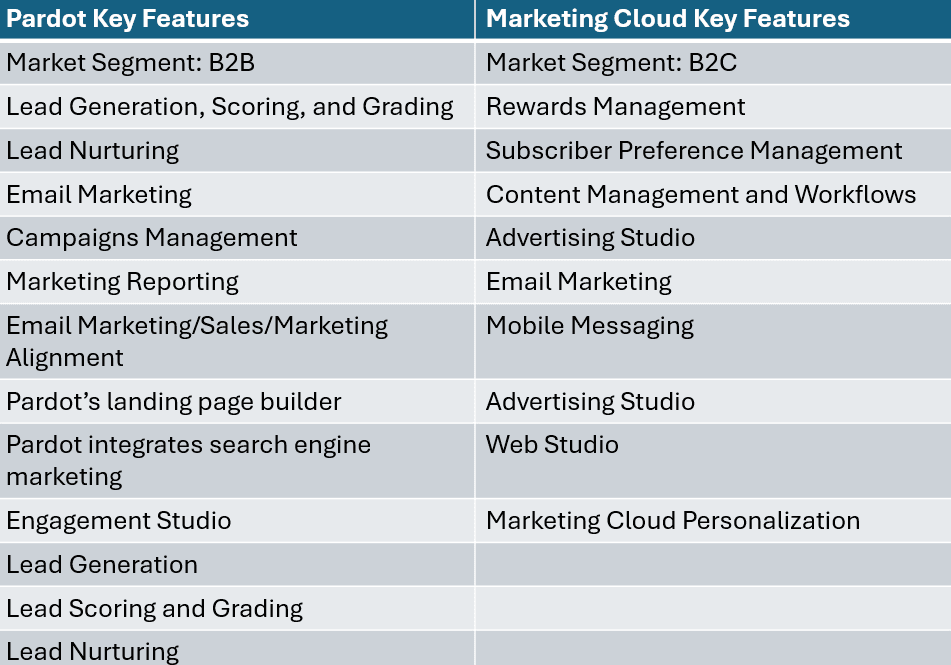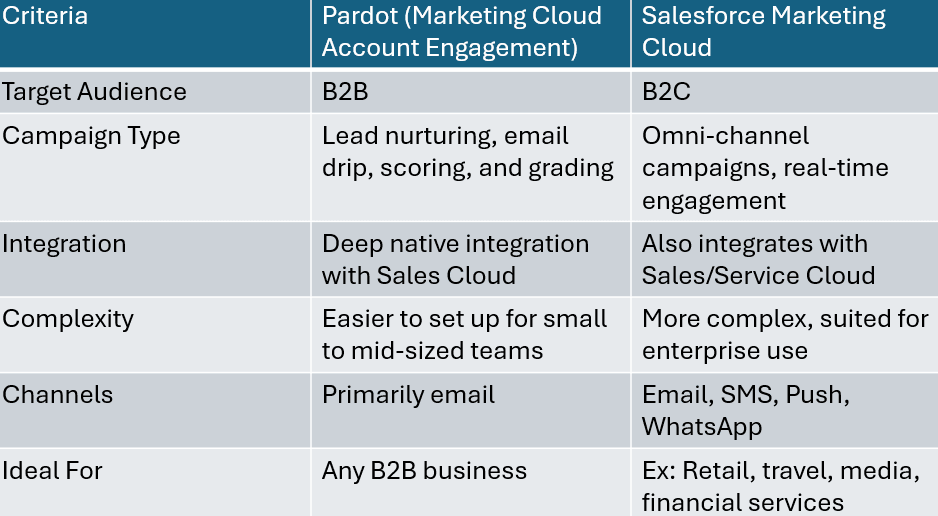Marketing is not easy as it seems. Pitching through the right product, publishing the right content, attracting leads, and making people buy again is not a cake walk. But, with automation stepping in – it can perform a lot of marketing activities for B2B companies. The drill is still the same to effectively communicate with the potential customer and effectively run a business. Just that, the process is simplified. In this article, we will illustrate on what is it and how Salesforce marketing automation help businesses scale.
What Is Salesforce Marketing Automation?
Salesforce marketing automation refers to the use of Salesforce’s powerful platforms, such as Marketing Cloud and Pardot (now known as Marketing Cloud Account Engagement), to streamline, personalize, and scale marketing efforts across channels. These platforms help businesses automate tasks like sending targeted emails, SMS, push notifications, and WhatsApp messages based on real-time customer data, behavioural triggers, or campaign workflows.
The future of marketing cloud reflects a rising curve as marketing actions directly with customer insights stored in Salesforce CRM, companies can deliver timely, relevant, and highly personalized experiences throughout the customer journey.
Marketing automation in Salesforce also supports lead generation, lead scoring, customer nurturing, and multi-touch campaign tracking all from a single integrated environment. As businesses grow, automation ensures consistency, reduces manual errors, saves time, and improves marketing ROI. Whether you're focused on high-volume B2C campaigns or relationship-driven B2B funnels, Salesforce marketing automation tools are built to adapt and scale alongside your business goals.
The Differences Between Pardot and Marketing Cloud
The differences between Pardot and Salesforce Marketing Cloud will provide an overview of the features each one offers and key notes to consider when deciding which tool is better for your business. By understanding both platforms, you will be able to make an informed decision on which platform fits your business needs.
Suppose we get the question like "What is the difference between Pardot and Marketing Cloud?". In that case, the immediate response will be around - "Salesforce Marketing Cloud Engagement is for B2C marketing, and Pardot (Salesforce Marketing Cloud Account Engagement) is for B2B marketing".
Salesforce Marketing Cloud Account Engagement (Pardot) is used for 'considered purchases' where there are long sales cycles and multiple decision-makers, which is typical of B2B, but not exclusively.
Salesforce Marketing Cloud Engagement (SFMC) is best suited to transactional purchases in various marketing channels, which is typical of B2C, but not exclusively.
Let's see the Salesforce Marketing Cloud Engagement (SFMC) vs Salesforce Marketing Cloud Account Engagement (Pardot) breakdown.


Is Pardot Part of Marketing Cloud?
This is a common point of confusion for many. While Marketing Cloud Account Engagement (Pardot) falls under the broader Salesforce Marketing Cloud umbrella, it is different from the core Marketing Cloud platform. Thus, it serves a different purpose.
Salesforce Marketing Cloud Account Engagement (Pardot) is a B2B marketing automation solution, while Salesforce Marketing Cloud Engagement is more robust and geared toward B2C use cases. Though both are part of the Salesforce ecosystem and share some integration capabilities, they are separate products with distinct user interfaces, features, and target audiences.
Core Features of Salesforce Pardot
Salesforce Marketing Cloud Account Engagement (Pardot) is designed specifically for B2B marketing and sales alignment. Some of its standout features include:
• Lead Scoring & Grading: Automatically score leads based on engagement and grade them based on fit, ensuring sales teams prioritize the top prospects.
• Email Marketing Automation: Create drip campaigns, track email performance, and trigger follow-ups based on user behaviour.
• Landing Pages & Forms: Quickly build landing pages and forms to capture leads and track conversions.
• CRM Integration with Salesforce Sales Cloud: Deep native integration allows for seamless sync between marketing and sales.
• Lead Nurturing: Design automated journeys that guide leads through the funnel over time.
• Campaign Reporting & ROI Tracking: Easily measure campaign effectiveness with detailed analytics.
Top Features of Salesforce Marketing Cloud for Your Business
Salesforce Marketing Cloud is a powerful platform built to support enterprise-scale B2C marketing needs. Here's how it can add value to your business:
• Customer Journey Management: Create and automate 1-to-1 journeys across email, SMS, push, web, and more.
• Audience Segmentation: Use real-time data to create dynamic, personalized audience segments.
• Email Studio: Design and send highly personalized and scalable email campaigns.
• Mobile Studio: Reach customers via SMS, push notifications, and mobile messaging.
• Advertising Studio: Run personalized ad campaigns across social platforms like Facebook, Instagram, LinkedIn, and Google.
• Marketing Cloud Personalization: Deliver real-time, contextually relevant experiences.
• Einstein AI: Leverage AI to optimize send times, predict customer behaviour, and personalize content.
Salesforce Marketing Cloud Engagement (SFMC) is ideal for companies looking to scale personalized engagement across millions of customers and multiple digital channels.
Can You Use Both Pardot and Marketing Cloud Together?
Yes, businesses can use both Salesforce Marketing Cloud Account Engagement (Pardot) and Salesforce Marketing Cloud (SFMC), depending on their audience and use case. For instance:
• A company targeting both businesses (B2B) and consumers (B2C) may benefit from using Pardot for B2B leads and Marketing Cloud for B2C campaigns.
• Integration between both tools is possible, though it often requires technical planning and may involve connectors or API integrations.
However, using both platforms effectively requires precise segmentation of your audiences, goals, and marketing strategies to avoid redundancy or data fragmentation.
Which Salesforce Marketing Tool Is Right for Your Business?
Choosing between Pardot and Marketing Cloud depends on your business model, marketing goals, and audience:

If you’re focused on long sales cycles, lead qualification, and relationship building, Pardot is your best bet. And, if you’re looking to engage consumers at scale across multiple channels, Marketing Cloud is the more suitable platform.
How Sedin Can Help You Choose the Right Tool?
As a trusted Salesforce implementation partner, Sedin works closely with businesses to understand their marketing goals, audience types, and operational challenges. Whether you're considering Pardot for B2B lead nurturing or Marketing Cloud for B2C engagement at scale, Sedin helps you:
• Evaluate your business needs and use cases
• Map your customer journeys and touchpoints
• Recommend the right Salesforce marketing solution
• Implement and integrate Salesforce with Marketing Cloud seamlessly
• Provide training and ongoing support for your teams
With Sedin Technologies Salesforce Partner, you can make a confident, strategic decision that maximizes your marketing ROI.





